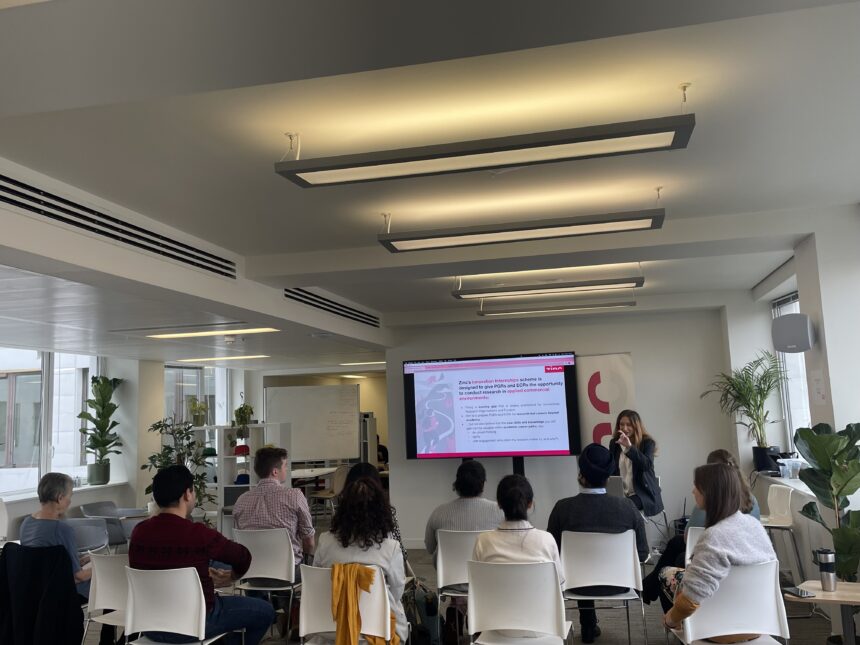Zinc’s PhD Innovation Internships: Eleanor’s perspective

Eleanor Moore recently participated in Zinc’s PhD student placement programme – where we match PhD candidates, whose funding covers an industry placement, to relevant startups and provide support & guidance. Read more about Eleanor’s experience below and find out her advice for anyone interested in applying to the next cohort.
My name is Eleanor, and my PhD is researching the trade-offs and benefits of tree planting for smallholder farmers in Tanzania at Newcastle University. My research experience and interests focus on social-ecological systems, particularly in farming landscapes and tree (re)integration into these landscapes. I did a placement with willow, a venture on a mission to make food systems regenerative and equitable.
I decided to do a placement outside of academia to experience something different. Working within environmental conservation and restoration, I always felt a bit pigeonholed into academia or the third sector, and I wanted to explore other options. There is also a growing movement within my field to work more closely with the private sector, so I thought this experience would equip me with the skills to understand their world, language, and mindsets better.
The mission-led aspect was crucial in applying for Zinc because it allowed me to do a placement within a venture that aligned with my experience and interests. When applying, I was open to what role I would do, but I was specific in that I wanted to be in an environmentally focused venture. The mission-led factor means everyone is passionate about their cause, which unites people. It makes it such an exciting place to be and work!
I have loved working with willow; they have made me a part of the team and allowed me to learn as much as possible from them. My day-to-day experience has been varied and a great mix of independent and group work. Since willow is still very early in the product development stage, an ongoing task I have had over the internship is outreach to professionals in the food industry. I set up interviews to understand the critical pain points faced by those teams when trying to make their supply chains and farming base more regenerative so willow can create a product to solve that problem. I am finishing the internship writing a report on this research I have been doing for a willow publication. I worked between home and the office but tried to come to London as much as possible. Being in the office has been fun and valuable for discussions and whiteboard sessions around interview themes and product ideas.
There has been so much value from my placement experience. Being able to join a venture at such an early stage (3 months since incorporation) when they don’t even know what their product will be is such a unique experience. Interestingly, the product development process isn’t so dissimilar from the research cycle. The significant differences are the pace and the mindset. The placement has taught me how to think differently, finding those pain points to change and thinking of how a product could solve those problems.
My eyes have been opened to the plethora of companies and start-ups in this space which will be helpful when I start looking for jobs after my PhD. It has also shown me that my skills learnt through academia apply to other contexts and industries and has probably given me more confidence to look at a broader range of jobs.
My advice to other doctoral researchers considering applying is to be clear and upfront about what you want to get out of the placement and make that clear to both Zinc and your venture. I was very set on working with an environmental start-up and feeling part of a team was very important. By clarifying that to Zinc, they could help place me with a venture that could provide that. If you aren’t sure of something, reach out to Zinc; the team is friendly and helpful. I reached out to Laura before applying, which cemented my decision to apply. If you are hybrid working, get into the office as much as possible because that is where you will get the most out of the placement and make those connections. Lastly, get stuck in and be as proactive as possible!
Zinc’s placement programme is for PhD candidates whose funding covers an industry placement. We match students to relevant startups, and provide onboarding, support and guidance. For more information and to apply, see: https://apply.workable.com/zinc-ventures-limited/j/84B6B2D5FB/
Join the Zinc community
Stay up to date with all Zinc updates and future posts as part of our fast growing community.
Featured Resources
Zinc Impact Report 2024
Zinc’s mission is to make the UK the best place to successfully start a venture which can have a massive impact on the health of people and the planet.
Increasingly, we are building deeper science ventures that serve global, industrial customers in environment and health, giving access to impact at a global scale.
Our 2024 Impact Report explores the challenges that need to be tackled to empower and enable talented founders from around the world to solve critical health and environmental challenges at scale, from here in the UK.
This report showcases success stories from the Zinc portfolio, and highlights how Zinc – and our growing community of hundreds of Founders, Fellows, Coaches, Partners and Funders – are working together to build a world-leading “Science-for-Impact” ecosystem for inception stage ventures in health and environment.
Impact Report 2023
We started Zinc with the hypothesis that missions are an effective way to attract highly ambitious, talented and experienced groups of innovators, who might not recognise themselves as “classic entrepreneurs” but are ready and able to start a new commercial and successful venture to tackle some of our most pressing societal issues.
The world has overcome the sorts of challenges we face today when it has adopted a mission-based approach to the biggest problems and brought together world-class talent to invent and innovate, e.g: NASA and landing a man on the moon, the LSE blueprinting the British welfare state, or the Gates Foundation aiming to eradicate diseases.
On this basis and assumption, we designed Zinc as a new mission-based Venture Builder — a place where global talent, ‘impact makers’, can join to experiment and develop new solutions to our most pressing societal issues.


